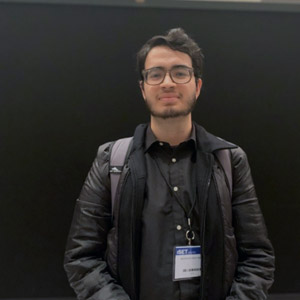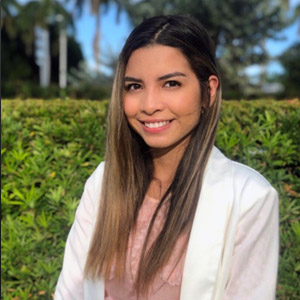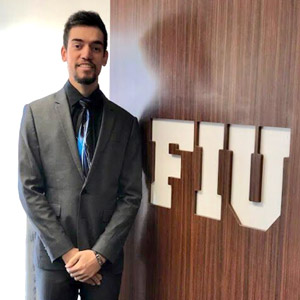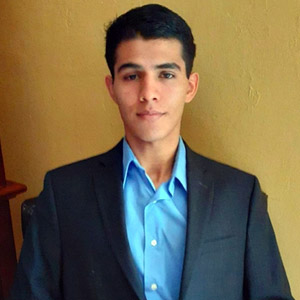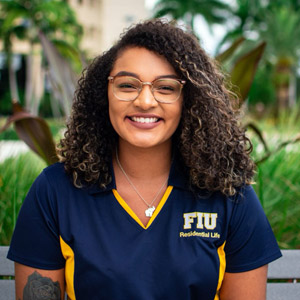The Coulter Undergraduate Research Excellence (CURE) Program has supported generations of our BME students to cultivate and strive for research success, and this summer was not the exception.
Due to the COVID 19 pandemic, several summer internships and opportunities for Research Experience for Undergraduates (REUs) were canceled. Students who were already accepted to start their new adventure felt extremely disappointed. The BME Department stepped in to support them in their quest and our CURE program offered eight students a unique online summer training experience.
The program lasted eight weeks, where students experienced research through a remote setting supported by the FIU BME Faculty. Here are some of their reflections on their involvement with the program and how it impacted their professional goals.
Nelson Abarca
How was your experience with the CURE program during Summer 2020?
My work was mainly a learning experience. I performed data analysis of calcium elevations in astrocytes. My lab partner and I compared using two different programs to measure these elevations. The programs were AQuA, a tool made for measuring astrocytic calcium elevations, and CNMFE, a tool used to study neuronal activity, but we figure it would also work for astrocytes. Each program had the pros and cons, but we found CNMFE to be better since its process for selecting cells is completely automated. I found this type of work a challenge as I am not used to computational work and prefer working at a wet lab, but I learned a new skill in the end.
How do you think the program supports you in your path of becoming a biomedical engineer?
I think this program supports me for a career in biomedical engineering research. Writing abstracts, interpreting experimental data, and presenting papers at journal club and career development workshops were great opportunities.
What was the most gratifying experience of being part of the CURE program?
CURE summer experience was great for me to be involved in my current lab remotely. I still had a summer REU social aspect by connecting with my PI, other lab members, BME faculty, and other CURE participants by zoom.
Allison Martinez
How was your experience with the CURE program during Summer 2020?
I have been investigating the electrical contribution of pericytes in the cerebral microcirculation. During the summer, I advanced so much in the investigation. I moved from a simple line of 15 endothelial cells with three pericytes to reconstructing a capillary network of about 170 endothelial cells and 85 pericytes. In addition, I did plenty of literature review and explored more about the different functions of pericytes. Also, my simulations started to become more elaborate and complex.
How do you think the program supports you in your path of becoming a biomedical engineer?
With all my mentor and labmates’ guidance, I finally decided to pursue a Ph. D. in Biomedical Engineering after finishing my undergraduate degree.
What was the most gratifying experience of being part of the CURE program?
Besides giving me the opportunity of pursuing research as an undergraduate with amazing faculty members, it is gratifying to see how the people I work with share my success and accomplishments. There is never-ending support among all the BME department, and I am incredibly grateful for that.
Heriberto “Andy” Nieves
How was your experience with the CURE program during Summer 2020?
The summer research goal was to characterize areas of notable delay in the system to ensure that the haptic feedback, or simulated sense of touch, was provided to the user in a reasonable amount of time. For the haptic feedback to feel realistic, the maximum amount of time between when the user expects the sensation of touch and when they feel the sensation should be no greater than 100 ms, and ideally much below that.
Our results showed that the majority of the delay of the system primarily results from the hardware that we are using (like our bio stimulator that electrically stimulates the median nerve of the user to feel sensations in the hand). Additionally, we found that sometimes there are occasional increases in the delay. Future work will reduce the total delay and make the system more consistent to maintain the realism of the interaction with the virtual objects.
How do you think the program supports you in your path of becoming a biomedical engineer?
The CURE summer program was an amazing opportunity to continue my previous research when everything stopped due to the pandemic. The BME department knew that many of our summer opportunities were canceled, and worked very hard to provide us with valuable experience through a remote setting. I am very grateful for Dr. Hutcheson for guiding us and leading the workshops we had throughout the summer that taught us valuable information about the research process and graduate school. I am also very thankful for the support of Dr. Jung and the members of the Adaptive Neural Systems Lab who have all been mentoring me as I strive to become a biomedical engineer.
Alejandro Guilarte
How was your experience with the CURE program during Summer 2020?
My research focused on a market analysis of lower limb prosthetic valve design toward improved structural & operational functionality via SolidWorks prototyping. It involved searching for and compiling different valve model schematics, highlighting each model’s key pros and cons, and obtaining user insights as to what improvements could be made. With guidance from peers and mentors, I learned how to navigate SolidWorks and utilize its features for model prototyping. I also learned about various simulation software such as ANSYS and its finite element analysis (FEA) features.
What is the most gratifying experience of being part of the CURE program?
With the proper environment, I cultivated the necessary competence and confidence in my technical skills in a constructive manner for future projects. I am grateful for the Coulter Undergraduate Research Excellence Program (CURE) in providing this opportunity. My success as a student has been the effort of everyone who took a chance on me — I strive to pay it forward and then some when I become a biomedical engineer.
Quianna Vaughan
Can you tell us how your experience was with the CURE program during Summer 2020?
It allowed me to gain research experience for my future and assisted with my decision to continue my academic career and go to grad school.
How do you think the program supports you in your path of becoming a biomedical engineer?
The program introduced me to another side of Biomedical Engineering. Once discussing my ideal goal and job for my future, I soon realized that goal depended on research and working in a lab.
What is the most gratifying experience of being part of the CURE program?
The most gratifying experience was being introduced to new faculty at FIU. Although I have had most professors for classes, I was able to get to know them on a more personal level. I now have two amazing new mentors preparing me for real-world scenarios I will soon face in my future.

